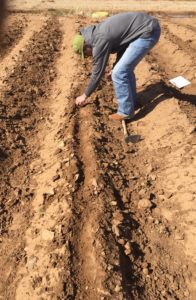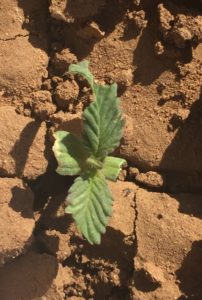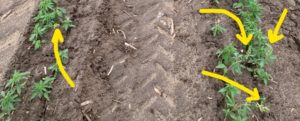Dr. Calvin Trostle, Professor & Extension Agronomist/AgriLife State Hemp Specialist, TAMU Dept. of Soil & Crop Sciences, Lubbock, (806) 746-6101, ctrostle@ag.tamu.edu
April 26, 2021
We will continue the statewide Zoom updates we began in March. I originally planned for “Third Thursday,” but there was a major conflict. The May update will be Tuesday, May 4, 5:15-6:30 PM Central Time. We will continue this throughout the summer at the same time on the first Tuesday. (If this is a poor timing for many hemp growers and industry staff, let me know. Early feedback was the difficulty for many to join between 8 AM and 5 PM due to employment.)
Register in advance for this meeting:
https://agrilife.zoom.us/meeting/register/tJwlceqgrTsiE9T0V6fLZdAsKZ3OmIbLJtWt
After registering, you will receive a confirmation email from Michael Clawson (his Zoom account, which can handle 100+ attendees) containing log-in information for the meeting.
Prices to Grow & Market a 2021 Texas CBD Crop
Recent information suggests feminized seed prices are about $0.25 to $1.50 per seed with an average of $0.70 each. Clones were $1 to $3 each. Some companies are now offering a “sale” on hemp seed or clones. This may be due to low demand in the market, with likely further decreasing acres for CBD across the country. This may leave companies keen on getting their inventory moved. Do not let “On Sale” deter you from purchasing what you believe is the right variety, especially one that is well known.
If you purchase clones for $2 each then plant the traditional 5’ X 5’ pattern that is 1,742 plants per acre, or $3,486/acre. If you sell biomass for CBD extraction at $0.50/lb. for each 1.0% CBD, and you can safely get 8.0% CBD, then you need 872 lbs./A biomass just to pay for the transplants.
Must hemp transplants be produced in Texas?
Originally, Texas Department of Agriculture intended hemp for transplants after 2020 must be grown in Texas. This is again waived for 2021 due to few sources of transplants in Texas yet. I know of at least two companies with Texas-grown transplants for sale. (If you are a Texas company with hemp transplants let me know.) Contact Calvin Trostle if you would like a referral (not an AgriLife endorsement) to learn about varieties, quality, prices, etc. and make a possible purchase decision.
Texas A&M AgriLife Variety Trials for 2021
AgriLife has offered hemp cannabinoid, fiber, and grain trials at several AgriLife field sites from the Lower Rio Grande Valley to the High Plains. We have received little interest from companies for this fee-based program. Perhaps that is a further reflection of the CBD hemp industry’s economics coming down to earth. (Eight companies participated in 2020.) I will have fiber trials at Lubbock and Chillicothe, and a small cannabinoid trial at Lubbock. If you have interest, please contact Calvin Trostle as we are planting shortly. If interested in the entry forms, contact me directly.
Texas A&M AgriLife Planting Date Observations, Lubbock
I am conducting a planting date observation in Lubbock for 2021. The objective is observation of photoperiod response in fiber and grain varieties. To recall, a major 2020 issue in Texas was northern fiber and grain varieties flowered within 30 days of planting. (For reference, the U.S. Canadian border is 49°N; much of Europe, except Italy, is 46-54°N). These northern fiber varieties averaged 16-28” tall under irrigation at Lubbock (normal growing lines were 6-7’ tall).
I first planted at Lubbock March 26 (Fig. 1). Soil crusts from watering every other day resulted in only a few plants emerging. Then emerged seedling suffered feeding damage we believe from cutworms (Fig. 2). So, a complete loss. The trial has been replanted. I will continue plantings on four-week intervals into August.
Fig. 1 (left). Hand planting hemp fiber variety planting date observation trial, Lubbock, TX (March 226, 2021).
Fig. 2 (right). Insect feeding (cutworms suspected) of the few emerged hemp fiber seedlings, Lubbock, TX (April 7, 2021).
My initial goal was trial sites in the Lower Rio Grande Valley (26.2°N), central Texas (30.5°N), Lubbock (33.4°N), and possibly partner with Kansas State or Colorado State at about 38°N, a latitude where some of these European fiber lines have grown normally in Colorado, Kentucky, and North Carolina.
I have restarted a set of 13 varieties. I will add a few more if available. This is an observation trial targeting at least 20 plants per date in duplicate single-row plots (Fig. 1). Plots will be evaluated at least weekly for onset of reproductive growth. Potential fiber yield will be estimated qualitatively.
Already—Initial Pre-mature Reproductive Growth of a European Fiber Variety in Texas
The first report I received on premature flowering of a northern fiber variety was from the Lower Rio Grande Valley March 31 (Fig. 3). Variety ‘Hliana’ (also translated ‘Glyana’), planted March 3, is from Ukraine (46-52°N). Texas was assured by a Ukrainian agronomist if planted early Hliana would not flower prematurely. It is in my Lubbock planting date trial. We will watch to see if it may return to vegetative growth as the days lengthen, which we have heard occurs on some hemp varieties.
Fig. 3. Industrial fiber hemp variety ‘Hliana’ (Ukraine) with premature reproductive growth, March 31, 2021, Texas Lower Rio Grande Valley. Planted March 3, 2021. The variety will undergo further observations at other Texas locations and planting dates.
Premature Flowering—How you can help!
For grain and fiber varieties, please e-mail me or send digital pics—any where in Texas at any planting date—of their growth and development. If they are flowering prematurely, we need to know. But equally, if they are growing normally, especially for at least 2 months, we need to know that as well. This will increase our much-needed observations in Texas to help us in 2022 and beyond.
Video Series: Economic & Legal Considerations for Hemp Production in Texas
Texas A&M AgriLife Extension Agricultural Economics
This series of 29 videos is available at https://agecoext.tamu.edu/resources/legal-and-economic-considerations-for-growing-hemp/ Topics cover legal, contracting, economics, and potential crop insurance. The website is divided into the sections below. Choose the YouTube video you want to see and also the slides for each presentation (3 to 15 minutes). The full series is ~3 hours long.
Hemp Basics (Dr. George Knapek, College Station, g-knapek@tamu.edu, 979.845.5913)
- What is Hemp and What is its History?
- The Hemp Plant
- Growing Hemp: Fiber, Grain/Seed, Cannabinoids (economic considerations, not agronomic)
- Hemp Acres
Legal Considerations of Hemp Production (Tiffany Lashmet, JDA, Amarillo, tiffany.dowelllashmet@ag.tamu.edu, 806.677.5600)
- Broad Overview of the USDA Final Hemp Rule
Hemp Contracting Considerations
- Contracting Considerations
- Hemp Specific Contracting Considerations
- Other Legal Considerations: Nuisance Claims & Texas Right to Farm Act
- Other Legal Consideration: Trespassing & Hemp for Feed
- Broad Overview of the Texas Hemp Production Rules
- Texas Hemp Rules: Licensing & Permits
- Texas Hemp Rules: Fees
- Texas Hemp Rules: Seeds & Transplants
- Texas Hemp Rules: Production
- Texas Hemp Rules: Inspection, Sampling, & Testing
- Texas Hemp Rules: Disposal of Unauthorized Plants
- Texas Hemp Rules: Enforcement
- Texas Hemp Rules: Reporting & Record Keeping
- Texas Hemp Rules Conclusion
Hemp Economic Considerations (Dr. Justin Benavidez, Amarillo, justin.benavidez@ag.tamu.edu, 806.677.5600)
- What are Hemp Budgets
- CBD Hemp Budgets
- Hemp Grain Budgets
- Hemp Fiber Budgets
- AgriLife Hemp Budget Tutorial
- Hemp Commodity Prices
- FARM Assistance Program—Hemp Production (Mr. Greg Kaase, College Station, g-kaase@tamu.edu, 979.458.3348)
Crop Insurance & Hemp in Texas (Dr. Steven Klose, College Station, sklose@tamu.edu, 979.845.1138)
- Crop Insurance Options for Texas Hemp Production, Part 1: Overview
- Crop Insurance Options for Texas Hemp Production, Part 2: Multi-Peril Crop Insurance (MPCI)
- Crop Insurance Options for Texas Hemp Production, Part 3: Whole Farm Revenue Protection (WFRP), Nursery, Non-insurable Crop Disaster Assistance Program (NAP)
Hemp Plant Disease Diagnostics—Texas A&M AgriLife @ Amarillo
Texas A&M AgriLife has designated the plant disease lab of Dr. Ken Obasa, Amarillo, as the primary lab to receive hemp samples requesting diagnostics of plant disease symptoms. It is best to notify Dr. Obasa in advance of sending samples, office 806.677.5600, ken.obasa@ag.tamu.edu There is a $75 diagnostic fee per sample for bacteria and fungi, $125 for viruses. The lab can also accept samples from out of state though there is an additional fee ($20). Samples shipped must contain a copy of your TDA license and a TDA transport permit. If you are unsure how to package your sample to ensure it arrives in timely fashion (use overnight service) and good condition, contact Dr. Obasa.
You will be able to download the needed hemp-specific form soon from http://thppdd-lab..tamu.edu The policy for hemp diagnostics and collection/packaging/submitting plants is on the back of the form.
Texas A&M AgriLife Hemp Potency Testing for THC & Cannabinoids
Sample analyses of hemp for THC and cannabinoids is available through Texas A&M AgriLife labs at Uvalde and Lubbock. College Station will be added soon.
Currently, these sites are not approved for processing of the official THC test you need 30 days before harvest. (These are the required samples that must be collected and delivered by an approved TDA sampler/handler.)
But if you need weekly analysis as your hemp grows in the reproductive stage or testing for THC in hemp products then these labs can handle your samples. For further information consult http://soiltesting.tamu.edu/hemp.html A price and discount schedule for bulk samples includes price breaks starting at 16+ samples to reduce the initial $59/sample cost.
There is a specific submission form at the above URL for each lab. Payment is required online before submitting samples. Likewise, you will need a TDA transport manifest for sample submission.
The Outcome—Winter Seeding of Hemp at Lubbock
I mentioned in the March newsletter I had planted a few hemp varieties in December to see what would happen. Hemp has a reputation, especially juvenile hemp (seedlings), of readily tolerating temperatures to the mid & low 20s°F. Germination and emergence took up to four weeks. The prolonged freeze of Feb. 13-20 (lowest temperature -1°F) killed all but a few seedlings of Poland’s ‘Bialobrzeskie’ that had a little protection from some sorghum/sudan stubble. As of April 20, a couple of the surviving seedlings may be forming a seed head.
Ongoing Texas A&M AgriLife Extension Hemp Resources
We continue adding resources at http://agrilifeextension.tamu.edu/hemp including under ‘Hot Topics & Latest Updates’ on the main page. Further production updates will be posted the week of May 3.
Our Hemp Program Twitter Account
My staff has established @TXAgriLifeHemp to provide regular updates on Texas hemp.
Do you have hemp questions?
Find regional and topical Texas A&M contacts for hemp at https://cdn-ext.agnet.tamu.edu/wp-content/uploads/2020/02/AgriLife-Hemp-Resources-Personnel-2020-02Feb10-Trostle.pdf
If you have a question that we can include in our Twitter communication or via this newsletter, please e-mail Calvin Trostle.
Upcoming Texas A&M AgriLife Extension Hemp Programs
None scheduled at this time but anticipate an Austin/College Station hemp farm visit & field tour near May 24.


